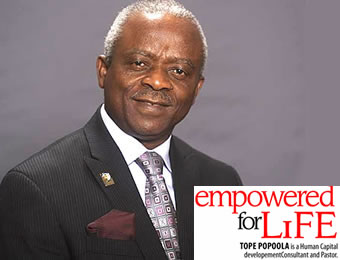In recent years, there has been quite some emphasis on leaders discovering, embracing and developing their strengths. Books and scores of seminars have been held on the subject. This is in the belief that we function best at the things for which we feel a natural proclivity towards in terms of flair and capacity. So the admonition to develop along the lines of our strengths while ignoring or at least deemphasizing our weaknesses, may not be entirely misguided. When leaders function in their area of strength, it engenders confidence and makes work pleasurable, leading to enhanced achievement potential. On the other hand, it is believed that focusing on your weaknesses and overcoming them would make you lose sight of your strengths and may lead to great frustration especially when you discover that you constantly underperform and have no sense of fulfillment. This is the reason why there has been great emphasis on developing your strengths and ‘starving’ or sometimes ‘staffing’ your weaknesses
As with every truth stretched too far, the theory of focusing only on your strengths can sometimes become an overhyped theory that may actually stifle creativity and discourage change and personal growth.
Without doubt, leaders need to appreciate their strengths and endaevour to develop them. That way, they can apply themselves with viogour in the areas of tjheir core competence without a need to reinvent the wheel by seeking to improve on skills they have already mastered. This enables them to leverage their core skills for personal and corporate success.
However, an undue focus on functioning only in the areas in which one is strong may actually become an albatross if not well handled. According to Sylvester Taylor of the Centre For Creative Leadership, certain skills hampered on too much can actually become weaknesses!
Confidence in his capacity can make a leader become overly decvisive. More often than not, this strength is peceived as arrogance by the followers who aree persuaded that such leader is not only high-handed but is also snubbish!
Furthermore, when a person is so convinced that he only needs to focus on his strengths, he may become impervious to change because he believes that he is good enough at what he does and if anyone needs to change, it should be those who cannot match his pace! Operating under this misguided illusion eventually becomes a problem to the leader especially when the context of function changes. If care is not taken, he may continue to think that current skills would always match performance even when the demands of the job have changed. Unfortunately, the idea of building on your strengths presupposes that you will never function in any of the areas where you consider yourself weak. Of course that is far from being true! As you rise on the corporate ladder, you will find yourself having to function in roles that are not in tandem with your core strengths.
Picture this scenario. You are a chartered Accountant. You love figures and practically overreach yourself working with figures. The evolution of corporate bottom-lines is what keeps your adrenaline pumping. But you do not enjoy the company of people as much as you enjoy the company of spreadsheets. The quality of your work has given you a reputation in the establishment for diligence and the uncanny ability to straighten out the knottiest issues that could hamper profitability. Now the board has noticed and has thought of a way to reward you for your labour. You arrive in the office one day to find that you have been nominated to fill the vacancy of the CEO which recently became vacant. On assuming the new position, you now discover that the days of playing hermit are over. Your new function would demand that you are now responsible for managing people and relationships on a broader level than seeing them at staff meetings! You, the same person who does not like the company of people, talk less of speaking to an audience, are now compelled not only to manage people but to address people on various platforms. Your new position compels you to relate with certain classes of people or join certain social clubs to advance the business. There is no doubt that when this happens, you cannot ignore your weaknesses in these areas anymore if you must make a difference in that position.
Rather than place so much premium on either side of the divide, that is, developing your strengths or improving in the areas where you are weak, learn to simply address issues as they apply to your situation and its peculiarities. Whether you are building on your strengths or working on your deficiencies, the critical issue is that you are growing your person and your ultimate outcome. Find out what skills best serve you, your role as well as the organization that you lead and do your level best to develop those.
Take time to do an honest assessment of your core strengths and your weaknesses, not because you want to become puffed up or self deprecating as the case may be, but because you want to use the knowledge as a platform for change. Where you are not sure, be humble enough to take feedback from your boss, colleagues or even subordinates who all know one thing or the other about you that you may be blind to!
Gain perspective. You must have a proper esteem of your capacity. Underrating your capacity means the possibility of underperforming. On the other hand, overrated strengths may actually translate to undermining your own effectiveness and ability to connect with those you lead.
Finally, critically evaluate your situation and deliberately set goals for improvement. To do these, you need to ask yourself some hard questions. Are your weaknesses constituting a stumbling block to personal and corporate progress? Are your strengths giving you the results that you require? If you could successfully change things, what would you be doing differently that would yield the greatest benefit to the pursuit of your leadership goals and the effectiveness of corporate operations and results? Are there specific things you would need to give up in the moment if the future you envisage must become a reality.
Be brutally honest with yourself. Even if people around you do not want to tell you anything negative about yourself because they don’t want the security of their position with you threatened, do not deceive yourself. The answers you get would reveal the most important issues in your circumstance.
One more thing. The identification of your weaknesses must never be done outside your desire to improve your function, not to beat yourself down. If you are a leader, it must be that you have certain intrinsic and extrinsic value to the organization. So. you are already operating from a position of strength. So start the quest. Stretch. Learn. Change. Grow.
Remember, the sky is not your limit, God is!





